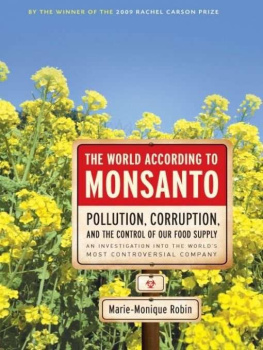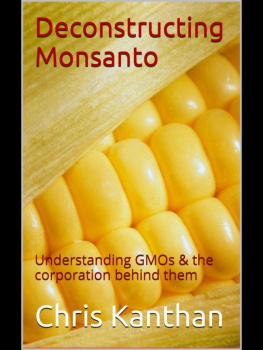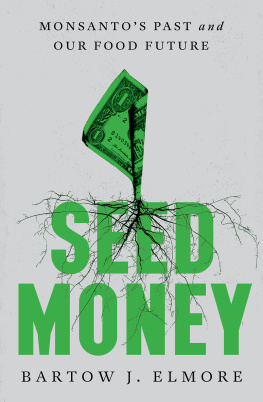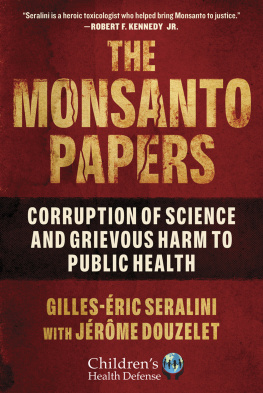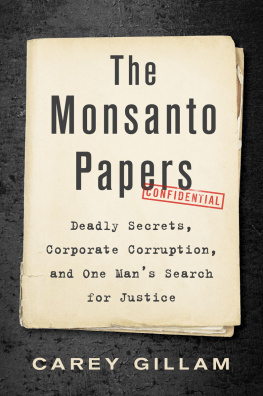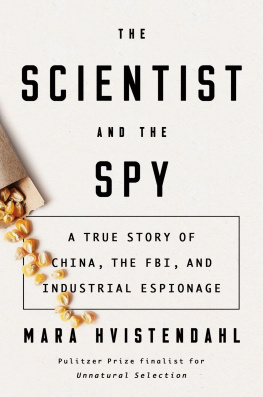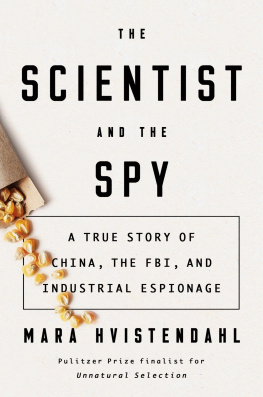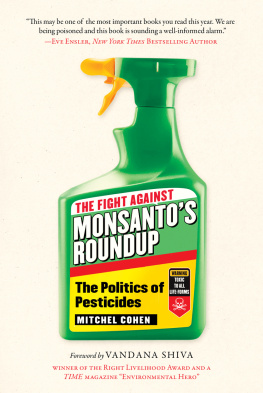Published in Australia by Spinifex Press in 2010
Published by arrangement with The New Press, New York
Spinifex Press Pty Ltd
504 Queensberry Street
North Melbourne, Victoria 3051
Australia
www.spinifexpress.com.au
2008 by Marie-Monique Robin
2008 by ditions La Dcouverte / Arte Editions
English translation by George Holoch 2010 by The New Press
All rights reserved. Without limiting the rights under copyright reserved above, no part of this publication may be reproduced, stored in or introduced into a retrieval system, or transmitted, in any form or by any means (electronic, mechanical, photocopying, recording or otherwise) without prior written permission of both the copyright owner and the above publisher of the book. Requests for permission to reproduce selections from this book should be mailed to:
Permissions Department, The New Press, 38 Greene Street, New York, NY 10013.
COPYING FOR EDUCATIONAL PURPOSES
Information in this book may be reproduced in whole or part for study or training purposes, subject to acknowledgement of the source and providing no commercial usage or sale of material occurs. Where copies of part or whole of the book are made under part VB of the Copyright Act, the law requires that prescribed procedures be followed. For information contact the Copyright Agency Limited.
NATIONAL LIBRARY OF AUSTRALIA CATALOGUING-IN-PUBLICATION DATA
Robin, Marie-Monique. The world according to Monsanto : pollution, politics and power / Marie-Monique Robin ; translated by George Holoch.
Translation of: Monde selon Monsanto.
Includes bibliographical references and index.
1. Monsanto Company. 2. Agricultural innovationsUnited StatesSocial aspects. 3. Agricultural chemicals industrySocial aspects. 4. Agricultural chemicals Environmental aspects. 5. Social responsibility of business. 6. Food supply. 7. Human rights and globalization. I. Title. II. Holoch, George.
338.7660973
ISBN 978-1-876-75683-3 Master e-book ISBN
ISBN 978-1-74219-504-9 (ePub Format)
ISBN 978-1-87675-683-3 (pbk.)
Composition by NK Graphics
This book was set in Fairfield
Cover design by Ann Weinstock
To my parents, Jol and Jeannette, farmers who taught me to love the good things of the earth, and so to love life.
Contents
Preface
A Book for Public Health
Nicolas Hulot
As I progressed in my reading of Marie-Monique Robins book, a flood of weighty questions overwhelmed me, filling me with anxiety that I might sum up in a single question: how is this possible? How can Monsanto, that emblematic firm of global agrochemistry, have made so many fatal mistakes, and how can it have marketed products so harmful to human health and to the environment? How has the company succeeded in conducting its business as though nothing had happened, constantly extending its influence (and its wealth), despite the tragedies its products have caused? How has it so quietly managed to continue its activities unconcerned and fool everyone? Why has it been able to carry on despite the heavy legal penalties it suffered and despite the bans imposed on some of its products (unfortunately, after they had already caused a good deal of irreparable harm)?
This book discloses a reality that hurts the eyes and grips the heart: that of a calmly arrogant company heedlessly profiting from the suffering of victims and the destruction of ecosystems. As the pages go by, the mystery is revealed. They show the prospering of a company whose history constitutes a paradigm of the aberrations in which industrial society has become mired. You may often shake your head in disbelief, but the demonstration is limpid, and we understand where Monsanto gets its power, how its lies have won out over the truth, and why many of its allegedly miraculous products in the end turned out to be nightmares. In other words, at a time when the North American company has taken on an even more totalizing ambition than beforeimposing genetically modified organisms (GMOs) on farmers and food consumers around the worldthis indispensable book raises the question, while there is still time, of whether it is necessary to allow a company such as Monsanto to hold the future of humanity in its test tubes and to impose a new world agricultural order.
Consider the facts. How did Monsanto become one of the major industrial empires on the planet? By accomplishing nothing less than the large-scale production of some of the most dangerous products of modern times: PCBs, which were used as coolants and lubricants, are devastatingly harmful to human health and the food chain and were banned after massive contamination was observed; dioxin, a few grams of which is enough to poison a large city and the manufacture of which was also banned, was developed from one of the companys herbicides, which was the basis for the grimly famous Agent Orange, the defoliant dropped on Vietnamese jungles and villages (which enabled Monsanto to secure the largest contract in its history from the Pentagon); bovine growth hormonesthe first test products for GMOsare intended to cause the animal to produce beyond its natural capacities regardless of the known consequences for human health; the weed killer Roundup used to be presented in endless advertising as biodegradable and favorable to the environment, a claim flatly contradicted by legal decisions in the United States and in Europe.
I have had serious doubts regarding certain practices of this company, particularly its use of police tactics against farmers. Marie-Monique Robins book not only confirms them but reveals both a company driven by the engine of business alone, which is hardly surprising, and, more troubling, a company whose actions are based on an extraordinary sense that it can do as it likes. She sketches a portrait of a firm that is expert at slipping through the cracks and persisting in its practices against all comers, no doubt convinced that it knows better than anyone else what is good for humanity, persuaded that it is accountable to no one, appropriating the planet as its playing field and profit center. In Monsantos position outside democratic control, it is hard to tell whether it is commercial blindness, scientific arrogance, or pure and simple cynicism that dominates.
Robins investigation is both dense and laser sharp; testimony is abundant and concordant, documents are revealed, and archives are deciphered. Her book is not a pamphlet filled with fantasy and gossip. It brings to light a terrifying reality. For, in the course of many years of marketing its products PCBs, herbicides, dioxin, bovine growth hormones, RoundupMonsanto was fully aware of their harmfulness. The documents that the book reveals leave no doubt on that subject. Monsanto developed the habit of publicly asserting the opposite of what was known inside the company. Thanks to Robin, we now know what Monsanto knew. The company was aware of the toxic effects of its products. It persevered nonetheless, and it was allowed to go on.


